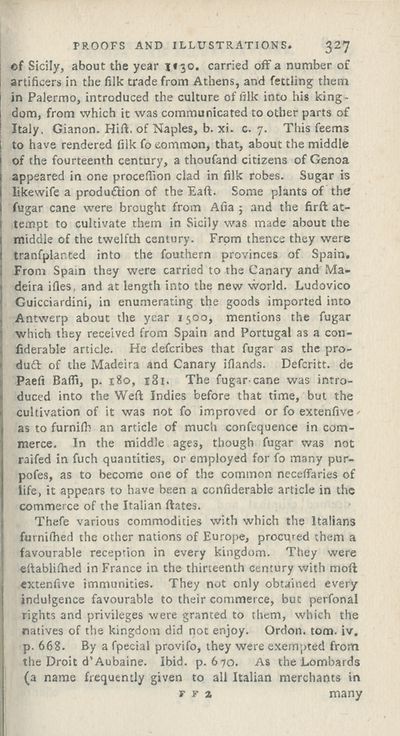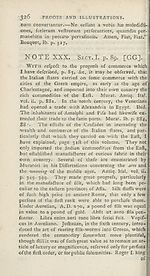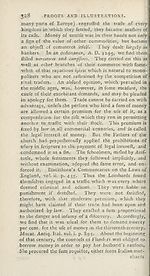Download files
Complete book:
Individual page:
Thumbnail gallery: Grid view | List view

PROOFS AND ILLUSTRATIONS. 327
of Sicily, about the year i»30. carried off a number of
artificers in the filk trade from Athens, and fettling them
in Palermo, introduced the culture of filk into his king¬
dom, from which it was communicated to other parts of
Italy. Gianon. Hift. of Naples, b. xi. c. 7. This feema
to have rendered filk fo common, that, about the middle
of the fourteenth century, a thoufand citizens of Genoa
appeared in one proceffion clad in filk robes. Sugar is
likewife a produdlion of the Taft. Some plants of the
fugar cane were brought from Afia ; and the firft at¬
tempt to cultivate them in Sicily was made about the
1 middle of the twelfth century. From thence they were
I tranfplanted into the fouthern provinces of Spain.
I From Spam they were carried to the Canary and Ma¬
deira ides, and at length into the new world. Ludovico
Guicciardini, in enumerating the goods imported into
Antwerp about the year 1500, mentions the fugar
which they received from Spain and Portugal as a con-
fiderable article. He defcribes that fugar as the pro-
duft of the Madeira and Canary ifiands. Defcritt. de
Paefi Bafii, p. 180, 181. The fugar-cane was intro¬
duced into the Weft Indies before that time, but the
cultivation of it was not fo improved or fo extenfive
as to furnifh an article of much confequence in com¬
merce. In the middle ages, though fugar was not
raifed in fuch quantities, or employed for fo many pur-
pofes, as to become one of the common necelfaries of
life, it appears to have been a ccnfiderable article in the
commerce of the Italian ftates.
Thefe various commodities with which the Italians
furnilhed the other nations of Europe, procured them a
favourable reception in every kingdom. They were
eftabltfhed in France in the thirteenth century with moft
extenfive immunities. They not only obtained every
indulgence favourable to their commerce, but perfonal
rights and privileges were granted to them, which the
natives of the kingdom did not enjoy. Ordon. tom. iv.
p. 668. By a fpecial provifo, they were exempted from
the Droit d’Aubaine. Ibid, p.670. As the Lombards
(a name frequently given to all Italian merchants in
f f 2 many
of Sicily, about the year i»30. carried off a number of
artificers in the filk trade from Athens, and fettling them
in Palermo, introduced the culture of filk into his king¬
dom, from which it was communicated to other parts of
Italy. Gianon. Hift. of Naples, b. xi. c. 7. This feema
to have rendered filk fo common, that, about the middle
of the fourteenth century, a thoufand citizens of Genoa
appeared in one proceffion clad in filk robes. Sugar is
likewife a produdlion of the Taft. Some plants of the
fugar cane were brought from Afia ; and the firft at¬
tempt to cultivate them in Sicily was made about the
1 middle of the twelfth century. From thence they were
I tranfplanted into the fouthern provinces of Spain.
I From Spam they were carried to the Canary and Ma¬
deira ides, and at length into the new world. Ludovico
Guicciardini, in enumerating the goods imported into
Antwerp about the year 1500, mentions the fugar
which they received from Spain and Portugal as a con-
fiderable article. He defcribes that fugar as the pro-
duft of the Madeira and Canary ifiands. Defcritt. de
Paefi Bafii, p. 180, 181. The fugar-cane was intro¬
duced into the Weft Indies before that time, but the
cultivation of it was not fo improved or fo extenfive
as to furnifh an article of much confequence in com¬
merce. In the middle ages, though fugar was not
raifed in fuch quantities, or employed for fo many pur-
pofes, as to become one of the common necelfaries of
life, it appears to have been a ccnfiderable article in the
commerce of the Italian ftates.
Thefe various commodities with which the Italians
furnilhed the other nations of Europe, procured them a
favourable reception in every kingdom. They were
eftabltfhed in France in the thirteenth century with moft
extenfive immunities. They not only obtained every
indulgence favourable to their commerce, but perfonal
rights and privileges were granted to them, which the
natives of the kingdom did not enjoy. Ordon. tom. iv.
p. 668. By a fpecial provifo, they were exempted from
the Droit d’Aubaine. Ibid, p.670. As the Lombards
(a name frequently given to all Italian merchants in
f f 2 many
Set display mode to:
![]() Universal Viewer |
Universal Viewer | ![]() Mirador |
Large image | Transcription
Mirador |
Large image | Transcription
| Antiquarian books of Scotland > Kings & rulers > History of the reign of the Emperor Charles V. > Volume 1 > (345) |
|---|
| Permanent URL | https://digital.nls.uk/109186471 |
|---|
| Description | By William Robertson. London : Cadell and Davies, 1798. |
|---|---|
| Shelfmark | ABS.1.76.13 |
| Additional NLS resources: | |
| Description | Thousands of printed books from the Antiquarian Books of Scotland collection which dates from 1641 to the 1980s. The collection consists of 14,800 books which were published in Scotland or have a Scottish connection, e.g. through the author, printer or owner. Subjects covered include sport, education, diseases, adventure, occupations, Jacobites, politics and religion. Among the 29 languages represented are English, Gaelic, Italian, French, Russian and Swedish. |
|---|

